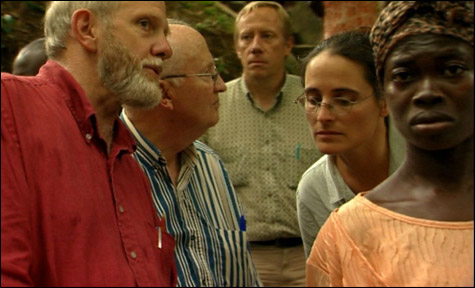
NO HAND WRINGING: Browne’s discovery of a dreadful family secret leads to a sober investigation of the Northern slave trade. |
Katrina Browne’s Traces of the Trade, which inaugurates P.O.V.’s 2008 season (June 29 on WGBX Channel 44, June 30 on WGBH Channel 2, both at 10 pm), is a legendary local documentary, eight rough years in the making, a film on which all hands in Boston indie production seem to have toiled at some point. (Disclosure note: my wife, Amy Geller, was employed, six years ago, as a line producer for several weeks of Rhode Island shooting.) It was laboriously edited and re-edited, as numerous people with documentary savvy were called in for consultation. Several years ago, I was privy to one of the endlessly retooled rough cuts.
But who wasn’t rooting for Traces of the Trade to find its way? Browne’s tale is an extraordinary one; it’s also urgent revisionist American history. In 2000, while soaking up her family genealogy, the proud saga of the wealthy, powerful, and respected DeWolf clan of Bristol, Rhode Island, Browne made an astonishing discovery. She learned that the DeWolfs had been, for three generations, our sovereign nation’s #1 family of slave traders. Never mind that their home base was in the “abolitionist” North — they became filthy rich by transporting African captives (10,000 in all) in shackles from Ghana to Cuba, selling them there for a massive 25 percent profit, then loading up with sugar and rum and sailing home triumphant to Bristol, where they built lovely mansions and funded the religious murals in their Episcopal churches.

Browne, a nice, liberal theology student, was horrified, as well she should be. What to do about these big bad DeWolfs? In 2001, she sent out a call across the USA to the DeWolf diaspora, inviting everyone to join her on a trip re-creating the slave journey, and thus acknowledging the evil that built the DeWolf empire. Sixty relatives answered back; nine hearty DeWolfs actually signed on for the journey, which, with their consent, also would be filmed. (Browne’s cousin, Thomas Norman DeWolf, has written a book on the experience for Beacon, Inheriting the Trade.) A camera crew followed the DeWolfs from Bristol to Ghana to Havana. Between emotional explorations of the actual hell spots of the slavery route, the family members sat about in circles and pondered what they saw, and their current-day responsibility in facing up to racism.
Browne, of course, appears in her documentary, and she provides the all-important voiceover. And therein lay the film’s big problem. What was the proper tone for her to take? Hard-boiled and ironic? Angry and preachy? Subjective? Objective? Implicated? Detached? The earlier version of Traces I saw was offputting because she was so self-indulgently guilty, guilty, guilty about the sins of her family. Clueless, she wondered on camera why the African-Americans she met couldn’t relate to her anguish. Chill, girl, relax!
The P.O.V. version — now directed by Alla Kovgan and Jude Ray — keeps Browne’s demons on a leash. She narrates her story in a somber, effective voice, and she puts the emphasis where it must be: on the dreadful history of Northern slaving. And on the creepy past of prosperous Bristol, where in the early 19th century practically the whole town was invested in the lucrative slave business. It’s like Shirley Jackson’s lethal stone throwers in “The Lottery.”